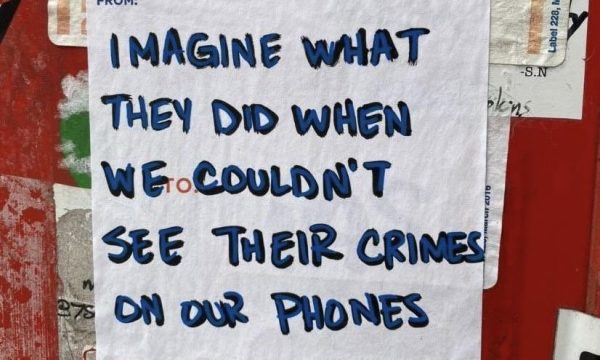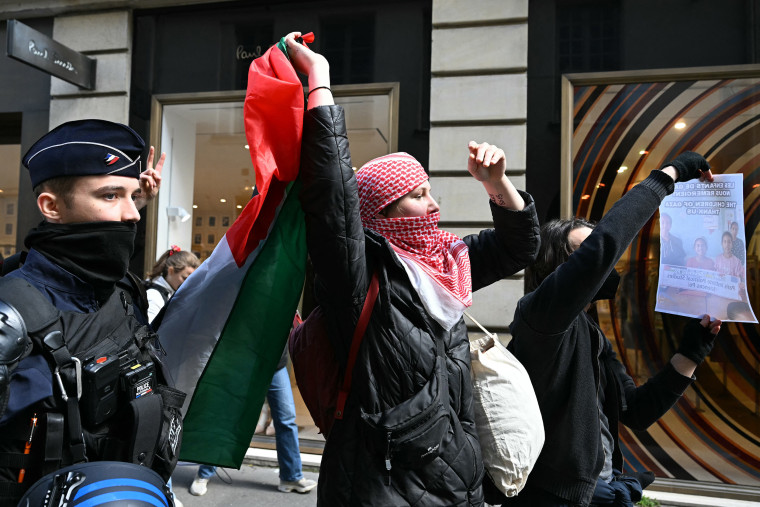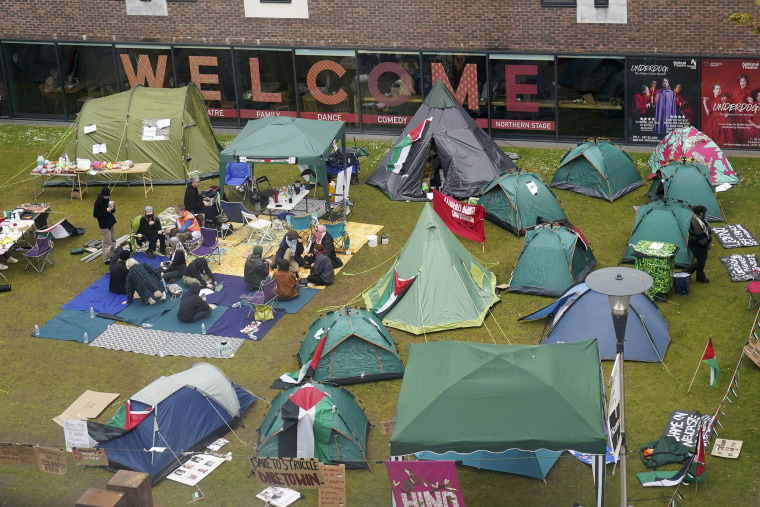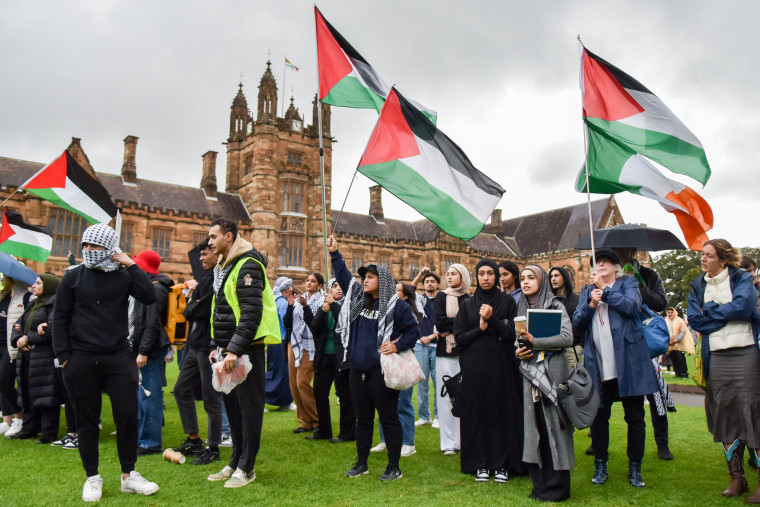Students set up indefinite pro-Palestinian encampment at McGill University
CBC
Sat, April 27, 2024
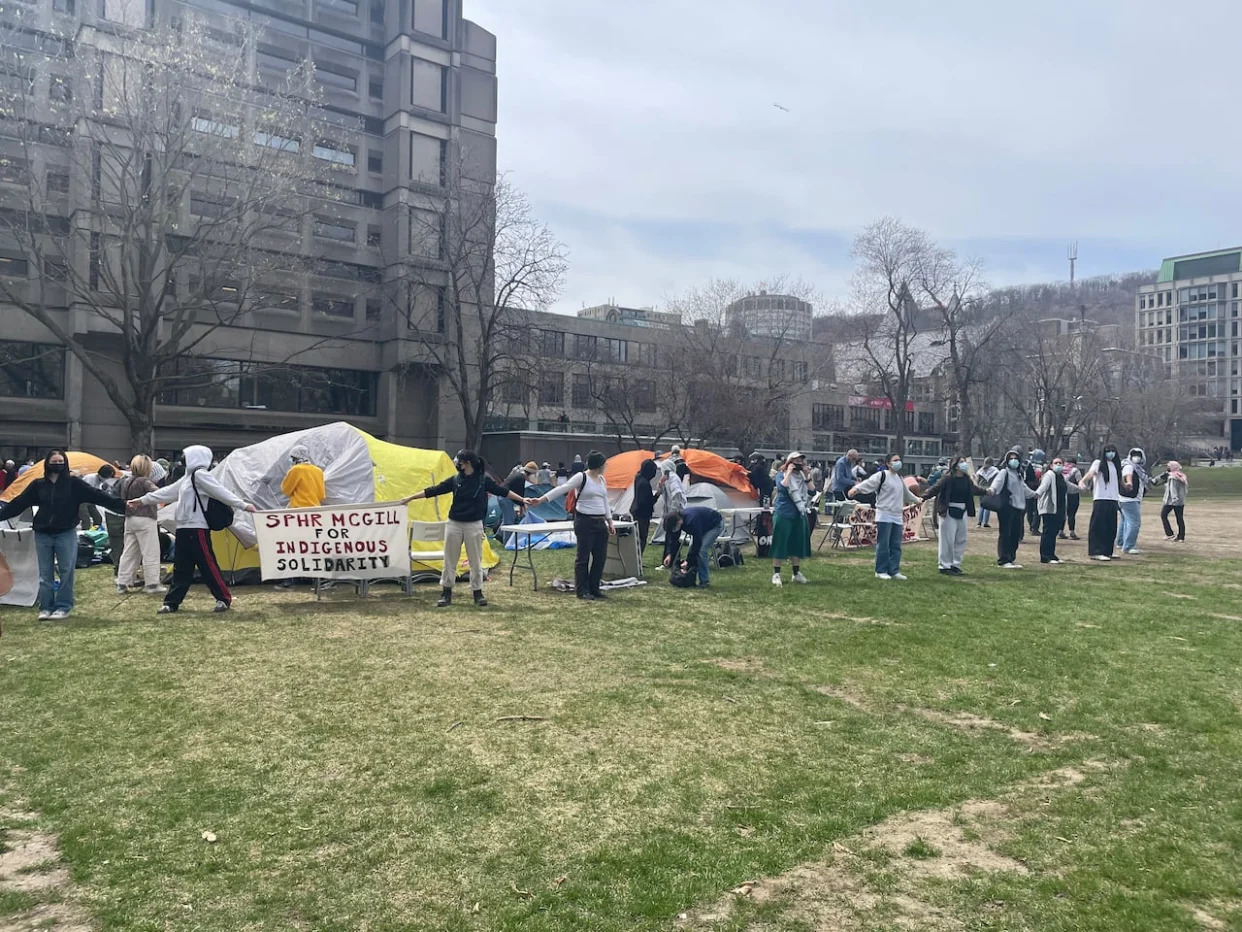
The indefinite encampment went up around 1:30 p.m. Saturday. (Jennifer Yoon/CBC - image credit)
About a dozen tents have gone up on McGill's downtown campus in what students are calling an act of solidarity with the Palestinian cause, joining a wave of similar protests taking place across U.S. campuses.
Protestors are demanding McGill and Concordia universities "divest from funds implicated in the Zionist state as well as [cut] ties with Zionist academic institutions," according to a statement sent to CBC News by Zaynab Ali, a McGill student participating in the protest.
The Montreal chapter of the Palestinian Youth Movement called the encampment "indefinite," adding that it refuses to let universities "be complicit in genocide," in a social media post on Instagram.
Another student group, Solidarité pour les droits humains des Palestiniennes et Palestiniens also urged UQAM's students and personnel to join in as well, in a post to Facebook.
In an email to CBC News, McGill University says it's aware the encampment is happening and it supports the right of its students to freedom of expression and freedom of assembly within the bounds of the university's policies and law. It says its security officers are on site.
Pro-Palestine protesters march through downtown State College, demanding Penn State changes
Halie Kines, Josh Moyer
Sat, April 27, 2024
Two days after rallying in front of Old Main on the Penn State campus, about 200 pro-Palestine protesters marched through downtown State College on Saturday afternoon, blocking traffic as a few police trailed closely behind.
Protesters chanted many of the same demands they made Thursday — including for Penn State to divest from Israel and to free Palestine. The protest was held in recognition of the upcoming International Workers Day because, organizers said on Instagram, workers’ struggles against oppressors aren’t unlike those facing the people of Palestine.
The march was also held on a day the university expected plenty of visitors, with its first outdoor concert at Beaver Stadium in seven years scheduled for 5:45 p.m. Saturday.
The protest began at the Allen Street gates at 2 p.m. Saturday, before marching through parts of Beaver and College avenues, along with Burrowes Street, Fraser Street, and others. Protesters also made stops at Old Main and Penn State’s Applied Research Laboratory, which is affiliated with the U.S. Department of Defense.

Pro-Palestine protesters march through downtown State College and the Penn State campus on Saturday afternoon for many of the same demands they made during a Thursday protest — including for Penn State to divest from Israel and to free Palestine.
A handful of police officers stood in front of the ARL’s door, and the march appeared to remain peaceful.
“We are here today as part of a movement,” said Roua Daas, of Penn State Students for Justice in Palestine, “as part of a movement of students, of community members, of Palestinians, of Black and Brown people everywhere that are saying, ‘We will not do this anymore.’ ...
“We will not stop. We will not stop until Penn State has divested. We will not stop until there is a ceasefire.”
Saturday’s march ended shortly after 5 p.m. Saturday, after protesters returned to campus and spent some time in front of Old Main.
The State College Police patrol officer in charge Saturday, Ken Shaffer, told the CDT that police were aware of the possibility of a march.
“It is a criminal violation to block a roadway like that, but we do give some leeway at times as long as no one is being hurt,” Shaffer added. “I’m not sure if that’ll be the case moving forward here, and that’s a decision that’s made every time by our administration.”
Penn State is the latest campus to see these types of recent events, joining other protests across the nation including University of Maryland, American University and Purdue University. Other colleges, like Harvard, Brown University and Michigan State University, have seen protesters set up encampments on campus. More than 400 arrests have been made across many campuses, according to the New York Times.
State College Police did not arrest anyone in connection with Saturday’s protest, as of late Saturday afternoon, and no damage had been reported, Shaffer said.
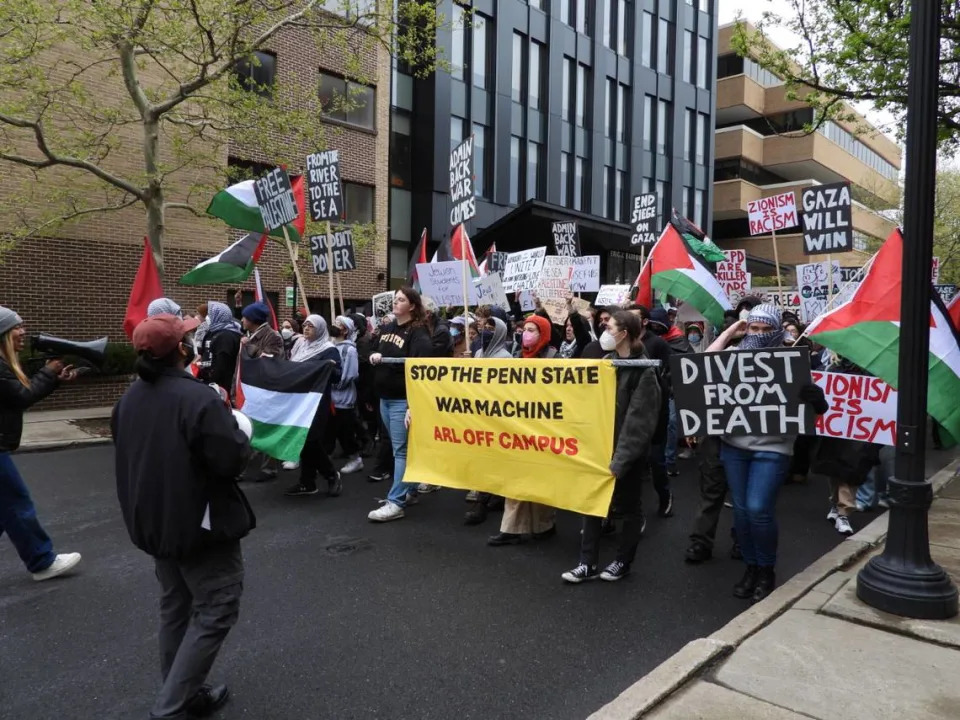
Pro-Palestine protesters march through downtown State College and the Penn State campus on Saturday afternoon for many of the same demands they made during a Thursday protest — including for Penn State to divest from Israel and to free Palestine
UNC students camped out to protest Israel-Hamas war say: ‘We will not be leaving.’
Korie Dean
Fri, April 26, 2024 at 11:29 a.m. MDT·5 min read
Students and others pitched tents on the campus of UNC-Chapel Hill Friday, calling on the university “to divest from the ongoing genocide in Gaza” and forming an encampment similar to others on college campuses nationwide.
The event, which began around 10 a.m., was organized by the UNC chapter of Students for Justice in Palestine, which has held protests and other events on campus this academic year to support Palestinians as the Israel-Hamas war continues.
“We emphasize that this encampment serves to show solidarity with Gaza, which now has no more universities due to Israeli massacres with US-made bombs. We stand in solidarity with our comrades at Columbia and across the US who have been repressed, arrested, and physically attacked,” the group said in a news release Friday morning, referencing the ongoing protests at Columbia University that have become a flashpoint of pro-Palestinian student activism in recent weeks.
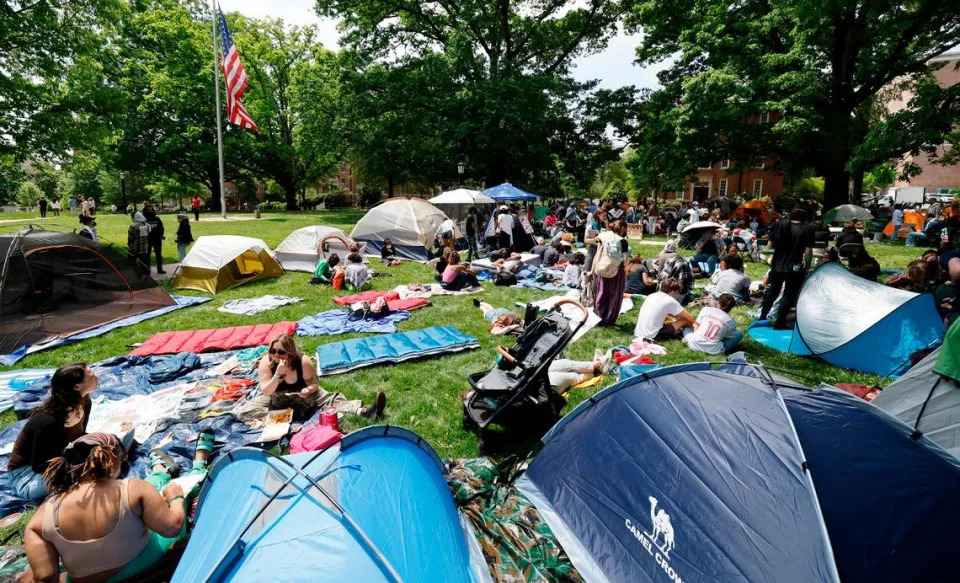
Protesters gather amongst their tents as part of a Gaza Solidarity Encampment at Polk Place on the campus of UNC-Chapel Hill on Friday afternoon, April 26, 2024.
“The central purpose, however, of this encampment is to meet the demands of the present moment, and to center Palestine and call attention to the university’s participation in the genocide in Gaza,” the release stated.
More than a dozen tents and over 100 people filled the middle of Polk Place, the central quad on the main part of campus. The tents were decorated with signs reading “Gaza solidarity encampment” and “free Palestine,” among other sayings.
Friday marked the second time in a week that the group has formed a tent encampment on campus to call attention to their demands. A week earlier on April 19, the group formed a similar encampment before being told by administrators that setting up temporary structures, including tents, on university grounds is prohibited unless approved in advance.

Protesters set up a tent as part of a Gaza Solidarity Encampment at Polk Place on the campus of UNC-Chapel Hill on early Friday afternoon, April 26, 2024.
Students on Friday were seen speaking with university administrators Christi Hurt and Desirée Rieckenberg — interim Chancellor Lee Roberts’ chief of staff and the dean of students, respectively — throughout the afternoon, appearing to negotiate terms that would allow the group to remain protesting but to take down their tents.
Friday around 1 p.m., a student organizer announced to the encampment that they had reached an agreement with the administrators to take the tents down by 1:45. The group, which removed the poles from the tents but left the fabric remaining on the ground, planned to remain on the quad at least throughout the afternoon — but likely much longer.
“I just want to say loud and clear, that even though we take the poles out of our tents, we will remain here,” the student organizer said around 1 p.m. “We will not be leaving until the university divests.”
An evening Shabbat service, hosted by Jewish community groups in collaboration with the encampment, was planned for 7:30.
What the students want from administrators
In an Instagram post Friday, UNC SJP outlined its four demands for the university: to “acknowledge the ongoing genocide in Palestine,” to provide “full transparency of UNC investments,” to divest “from companies complicit in this genocide” and to end university study abroad programs to Israel.
UNC SJP said in its news release that students have, since the war began, “asked to meet university administrators to discuss the communities’ demands for disclosing UNC investments and to demand divestment from companies that benefit from Israeli Apartheid and the ongoing genocide in Gaza.”
Sylvie, a UNC SJP member who identified themselves as a graduate student at the university but who did not provide their last name, told The News & Observer that the group has not received such a meeting.
“We have communicated our demands, which have not changed since October, to the administration, who has met us with not only ignorance and negligence, but also, as of recently, threats, discrimination and punishment, which we see as deeply concerning, and reflective of their ideological commitment to upholding the genocidal status quo,” Sylvie said.
At committee meetings of the university Board of Trustees last month, SJP members disrupted the proceedings multiple times with pro-Palestinian chants before being told, including by trustee Dave Boliek, that additional disruptions would result in their arrest. Under state law, anyone “who willfully interrupts, disturbs, or disrupts an official meeting and who, upon being directed to leave the meeting by the presiding officer, willfully refuses to leave the meeting is guilty of a Class 2 misdemeanor.”
At the full-board meeting the next day, Roberts invited the group to nominate a representative to address the trustees and list their concerns. The group nominated Sylvie, who spoke for roughly three minutes. Later, the group again began to chant over the meeting and were escorted out by university police.
Roberts said after the meeting that he “certainly” understands and appreciates the group’s “desire to be heard.”
“Peaceful protest has a long, noble tradition on this campus, on other college campuses in our country, across Western liberal democracies,” Roberts said.
Sylvie said Friday that they didn’t understand the administration’s “strategy” in allowing the group to speak.
“But it didn’t work,” they said. “Because we’re here now.”
The agreement reached between administrators and protesters Friday included only the decision to remove the tents, and did not result in a meeting with Roberts, Sylvie said.
Friday’s events were peaceful, with members of the encampment sharing meals, playing music and gathering for prayer. A group of about 15 to 20 counter-protesters arrived around 2:30 p.m. Several left quickly after speaking with UNC police chief Brian James, while others remained on the quad but at a distance from the encampment.
After the counter-protesters arrived, the members of the encampment began playing music and chanting phrases including “From the river to the sea, Palestine will be free.”
That chant has been a common rallying cry, but the Anti-Defamation League considers it an antisemitic phrase seeking the elimination of Israel and the removal of Jewish people from the area.
Mendy Heber, a rabbi, said he came to campus Friday to support Jewish students.
“I think the Jewish kids need support. I think they feel threatened and I think that [they] feel under siege,” Heber said.
Heber said he believes that the encampment at UNC and the similar ones at universities across the country are “a pretty organized effort to create havoc and make chaos all over,” which he believes protesters could use “as a leveraging point” to get government bodies and other agencies to meet their demands.
Sylvie said of the rally: “This is about freedom. This is about Palestine.”
“This is about humanity and people with consciences who believe that humanity deserves dignity.”

Students and others pitched tents on the campus of UNC-Chapel Hill Friday, protesting Israel’s actions in the Gaza Strip and forming an encampment similar to others formed on college campuses nationwide.
City College of New York becomes latest site of heated pro-Palestinian demonstrations
Roni Jacobson, Elizabeth Keogh and Cayla Bamberger, New York Daily News
Thu, April 25, 2024
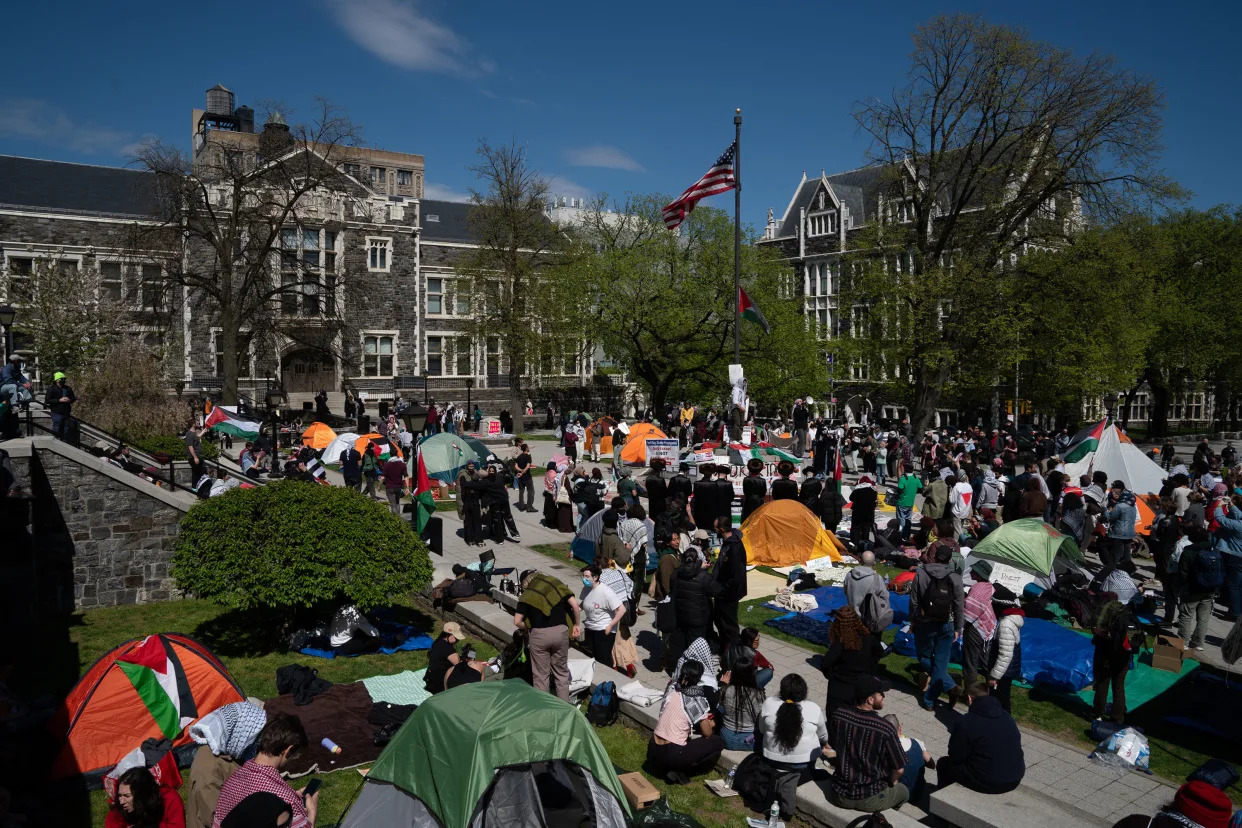
NEW YORK — Students set up a pro-Palestinian encampment Thursday at City College of New York, with one passerby being driven away when a protester claimed she could “smell” he was a “Zionist.”
Concern about antisemitism at protests sweeping campuses around the nation has grown in recent days, sparking demands for university officials to act more decisively to dismantle the demos.
Protests at Columbia University and New York University have led to the arrests of more than 200. The State University of New York’s Fashion Institute of Technology saw a small pro-Palestinian encampment pop up Thursday, following a similar demonstration at The New School.
At City College in Harlem, students have erected dozens of colorful tents around an American flagpole, where they also hung a Palestinian flag. “CUNY Students Resist Zionism” and “BY ANY MEANS NECESSARY,” signs read.
On Thursday night, protesters at the campus were seen booing a passerby and driving him away from the demonstration.
“I can sniff you, we can all sniff you,” one protester sneered at the man. “We can smell the Zionist on you.”
The protester told the New York Daily News the person she’d targeted was “frowning and recording” as he passed.
“I just could tell he was a Zionist,” said the woman. “They victimize themselves so quickly.”
CNN initially reported that university officials had been in touch with the NYPD, with plans to clear the encampment at about 5 p.m., but posted an update citing an unnamed law enforcement official saying “no action is imminent.” A call to the NYPD seeking clarification was not immediately returned.
“In solidarity with Palestine, while following the legacy of the CUNY student organizers that came before us, we have established the CUNY GAZA Solidarity Encampment at City College, the oldest campus from the City University of New York,” students wrote on Instagram.
CUNY students are calling for the university system to divest from Israel, ban partnerships and trips to Israel such as Birthright and Fulbright programs, reverse student and faculty disciplinary action related to pro-Palestinian activism and remove police from campus.
They also called on CUNY to release a statement “affirming the right of the Palestinian people to national liberation and the right of return,” and to make CUNY tuition-free.
“We demand a fully-funded, free CUNY that is not beholden to zionist and imperialist private donors,” the students wrote.
Throughout the afternoon, students shouted chants like, “Disclose, divest, we will not stop, we will not rest.” Some of them were skipping their plans for spring break, which runs through Tuesday, to be at the encampment.
“Frankly, I can’t really relax in a time like this,” said Andrew Shapiro, a PhD sociology candidate at the CUNY Graduate Center and part-time faculty member at Hunter College, who is Jewish. “I have not felt like I could relax comfortably, like I can be a student normally. Nothing feels normal as an ongoing genocide is happening, allegedly in my name.”
“People were away and they flew back in,” said Hadeeqa Arzoo, a student at City College. “They flew from home to be here, and I think that speaks volumes to what this means for many people.”
Arzoo, who’s majoring in political science and international relations, said the encampment at Columbia “really lit a fire under us” that could not be delayed until after the break. CUNY officials had not engaged in any negotiations as of Thursday afternoon, she noted.
“As of right now, we’re seeing what happens,” Arzoo said. “Because we’re not moving. We’re not gonna be intimidated into silence. We’re here.”
Meanwhile in Chelsea, students set up a similar encampment inside the Fashion Institute of Technology.
Demonstrators stormed into The Museum at FIT on W. 27th St. and Seventh Ave., Fox News reported. Video shows scores of people pushing through the doors, where a security guard worked to pull them closed but was overtaken.
“Free, free, free Palestine,” protesters shouted as they took over the lobby of the on-campus museum.
By early Thursday evening, about 60 protesters remained in the lobby, where tents and a sign stating “FIT Gaza Solidarity Encampment” were set up.
A student group said in a statement they’re calling on FIT to divest from Israel and provide amnesty from disciplinary action. Encampment rules include: “Do not under ANY circumstances talk with NYPD or media.”
The NYPD had not responded to the site as of Thursday evening.
“We are monitoring and managing the situation to ensure the safety of the entire FIT community, which remains our highest priority,” a FIT spokesperson said in a statement.
At City College, a spokesperson said it was in the process of determining if the protesters were affiliated with CUNY.
“While The City College of New York is strongly committed to the principles of freedom of speech and expression on campus, it is mindful of any action that may cause disruption to our community in any way,” the spokesperson said in a statement.
“CCNY’s longstanding position is that any legitimate protest — by any group that is part of our community — must be peaceful, respectful, nonthreatening, and devoid of any hatred or intimidation. It must also not interfere with any activities on campus.”
The encampment included a poster to “Support the Five Demands Viva Palestina,” resembling similar signage to “Support the Five Demands Viva Harlem U” in April 1969, when a group of Black and brown students set up a tent demonstration to promote racial equity.
____
Columbia University president Minouche Shafik in hot water for handling of pro-Palestinian protests
Mariamne EVERETT
AFP
Fri, April 26, 2024

As pro-Palestinian student protests at Columbia University continue, university president Minouche Shafik finds herself under fire from all sides as politicians, students and faculty all call for her to resign over her handling of the sit-ins. Columbia's university senate is scheduled to meet on Friday to vote on a resolution that would express displeasure with her decision to summon police to arrest protesting students on campus.
Shortly after the Israel-Hamas war entered its six month, pro-Palestinian students at Columbia University established an on-campus encampment on April 17 of approximately 50 tents, called the Gaza Solidarity Encampment, to put pressure on the elite Ivy League university to cut ties with Israeli academic institutions and divest from Israel.
The encampment was forcibly dismantled the following day when Shafik called on the New York City Police Department to intervene, resulting in the arrests of more than 100 protesters on suspicion of criminal trespassing. Columbia also suspended students participating in the protest encampment. After these mass arrests, demonstrators quickly regrouped and other students across the United States started organising their own sit-ins, including at universities in Los Angeles, Boston and Austin, Texas.
Many Columbia students also want Shafik to resign.
Pro-Palestinian student protests highlight lessons learned from past demonstrations
Lexi Lonas
Fri, April 26, 2024
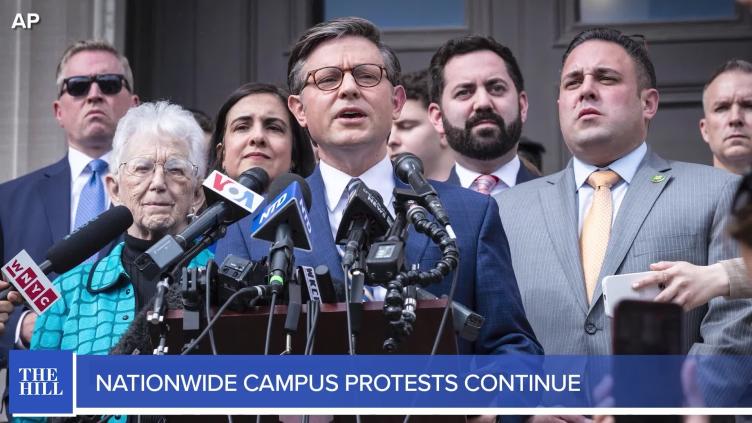
The pro-Palestinian protesters making themselves heard at universities across the country see their demonstrations as part of a tradition of anti-war activism on campus.
Hundreds of students have been arrested after setting up encampments on school grounds and demanding their institutions call for a cease-fire in Gaza and divest their endowments away from companies associated with Israel.
While universities and police have made changes over the decades in their handling of student protests, experts are pointing to similarities with years past on the activists’ demands and public perception.
“They are pretty similar in a number of important ways and also some of the responses that campuses took during that era echo some of the kinds of issues that are facing law enforcement and campus administrators now,” said Robert Corn-Revere, chief counsel for the Foundation for Individual Rights and Expression (FIRE).
Corn-Revere pointed to the free speech protests and anti-Vietnam War demonstrations of the 1960s, which also saw a “demand for many universities to take positions on the pressing issues of the day.”
“The same kinds of issues led Yale to consider how to handle free expression, and they issued what was called the Woodward Report in 1974. There’s sort of traced backgrounds of the kinds of disputes that had happened on Yale’s campus through the ’60s and into the ’70s and how to deal with those things,” Corn-Revere said.
The Woodward Report, which became Yale’s official guiding document for its free expression policies on campus, defends “the right to think the unthinkable, discuss the unmentionable, and challenge the unchallengeable.”
Corn-Revere said, “The same considerations of how to balance the need for preserving a wide space for freedom of expression and, at the same time, not to tolerate violence or disruption — it’s that same balance is what we’re facing today.”
In an Instagram post, the Students for Justice in Palestine chapter at Columbia University, where the current batch of pro-Palestinian protests began, showed an image likening the current demonstration to a protest at the school against the Vietnam War.
The post shows an image of Columbia students in 1968 protesting with a banner that says “Liberated Zone.” Another image on the same post shows pro-Palestinian protesters on campus with a banner that says the same thing.
As in the past, those willing to protest anti-war efforts believe the risk of school discipline pales in comparison to the cause they are fighting for.
“What we’re putting on the line is so minimal in risk, compared to what Gazans are going through,” Niyanta Nepal, a student at Brown University, told The New York Times. “This is the least we can be doing, as youth in a privileged situation, to take ownership of the situation.”
The biggest decision schools face in the short term is how to respond to the demonstrations. Columbia has seen multiple arrests, but school officials have attempted to negotiate with student leaders. While the encampment there that activists set up was supposed to be torn down Tuesday, the administration extended the timeline due to advances in talks with the demonstrators.
That move to talk with activists for a more peaceful resolution has not always been the go-to for schools.
Fifty and 60 years ago, “the campuses responded to them usually pretty heavy-handedly. I mean, the most important ones are the most infamous ones at Berkeley, and Wisconsin, and of course, also here in Ohio State,” said history professor David Steigerwald. “Authorities were called in on different levels. National Guard, local police, state police, typically in a pretty heavy-handed way in those most famous instances.”
At Kent State in 1970, four students were killed and nine were injured after the Ohio National Guard opened fire on a crowd protesting the Vietnam War. At the University of California, Berkeley, more than 800 students were arrested.
This week, the University of Texas at Austin vowed there would not be disruptions on campus, and state police made dozens of arrests Wednesday within hours of protesters leaving their classes to demonstrate.
Those arrests have sparked backlash from numerous free speech experts, as violence was not reported at the demonstration.
“The image I’ve seen from the University of Texas appears to be a disproportionate response to what the images suggest were a peaceful protest. And when you’re using preemptive government force against people who are protesting and not engaging in violence, then you err on the wrong side,” Corn-Revere said.
Experts say institutions today are more sensitive specifically to protests that disrupt student learning, which could make them more quick to try to shut down an event.
Robert Cohen, professor of social studies at New York University, noted that at Columbia in the 1960s, it took students occupying the inside of five buildings before the police were called.
“What’s different now is that at Columbia or here at NYU, the protests were not disruptive in any kind of way to the educational system,” Cohen said, adding the protests were outside on the lawn of the schools, where demonstrations have commonly taken place on campuses for decades.
However, many schools say that without proper permission, students cannot set up tents and stay on the premises overnight, and others say the behavior and rhetoric of the activists has crossed the line into antisemitism, creating an unsafe atmosphere for Jewish students even when actual classes aren’t being impeded.
Reports of antisemitism at the protests have been condemned by the White House, and Education Secretary Miguel Cardona said his department is following “reports about protests—including very alarming reports of antisemitism—on and around college campuses across the country. This Department of Education won’t tolerate hate, discrimination, and threats of violence that target students because of who they are.”
“If there are some incidents, then you go after the person who committed the harassment,” Cohen said. “It’s like, if the people in the apartment building — if there’s a crime, you don’t evict everybody, every apartment. You find out who did the crime, right?”
One thing the protesters definitely share with their anti-Vietnam predecessors: Public sentiment does not appear to be on their side.
Protests back in the 1960s and 1970s, “generally speaking, didn’t generate a whole lot of sympathy for the students’ positions,” Steigerwald said.
Corn-Revere argues colleges and governments have learned a lot about how to balance the line between free expression and violence, but implementing solutions is a more difficult task.
“The idea, at least from my perspective, is you err on the side of protecting free speech, you try to make clear that crossing the line into violence will not be tolerated. And that it is the government’s responsibility,” he said. “Sometimes the government, through the administration of the school, take steps to try and allow speech while preventing violence. Now the problem is, it’s a hard decision to make and we see people erring onone side or the other in different situations.”
What the pro-Palestinian protesters on college campuses actually want
Matt Egan and Ramishah Maruf, CNN
Fri, April 26, 2024
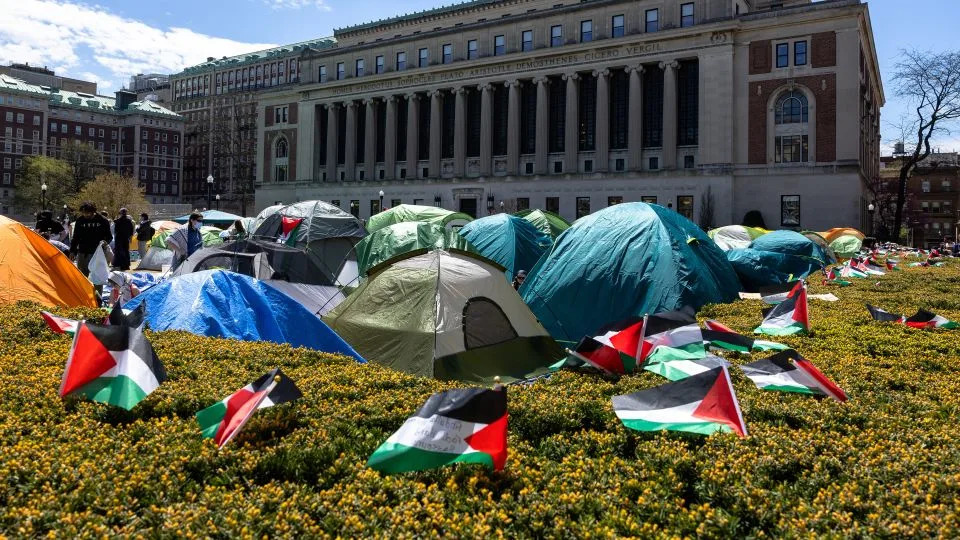
What the pro-Palestinian protesters on college campuses actually want
College campuses across America have been shaken by unrest that has resulted in clashes with police, shut down some classrooms and captured the attention of the nation.
Although much of the initial focus has been on antisemitic incidents and how university officials and police are responding to the demonstrations, all of this raises a fundamental question: What do the pro-Palestinian protesters actually want?
The specific demands of the protesters vary somewhat from school to school yet the central demand is that universities divest from companies linked to Israel or businesses that are profiting off its war with Hamas. Universities have largely refused to budge on this demand, and experts say divestment may not have a significant impact on the companies themselves.
Other common threads include demanding universities disclose their investments, sever academic ties with Israeli universities and support a ceasefire in Gaza.
“We asked that Columbia University pull all investments away from companies that profit off of the genocide of Palestinians or Israeli companies that profit off of the oppression of Palestinians,” Althea, a student protester at Columbia, told CNN. Althea asked for her last name not to be used for privacy reasons.

Student demonstrators occupy the pro-Palestinian "Gaza Solidarity Encampment" on the West Lawn of Columbia University on April 24, 2024 in New York City. - Michael M. Santiago/Getty Images
Protest movements at some universities are also calling for school officials to protect free speech and spare students from being punished for participating in the protests.
At the University of Southern California, where dozens were arrested on Wednesday, protesters are demanding “full amnesty” for those brought into custody and that there be “no policing on campus.”
At Princeton University, protesters are demanding, among other things, that the Ivy League school end research on weapons of war “used to enable genocide,” according to a flyer at a campus demonstration on Thursday.
Some demands are local.
At Columbia University, where the pro-Palestinian protest movement started last week, protesters are demanding support for low-income Harlem residents, including housing and reparations, according to Columbia University Apartheid Divest, the student group responsible for organizing the encampment.
The Columbia protesters are also calling for the university to “disclose and sever all ties” with the New York Police Department.
Students are also calling for an academic boycott from Israeli universities. For example, Columbia protesters want the university to sever ties with the school’s center in Tel Aviv and a dual degree program with Tel Aviv University. New York University protesters use the school’s Tel Aviv center as a rallying cry as well.
unknown content item
-
Is it possible to divest?
Still, divestment is at the top of the list of demands from protesters and the one they mention most often.
As Republican House Speaker Mike Johnson addressed students at Columbia on Wednesday, students chanted: “Disclose, divest, we will not stop we will not rest.”
Like many major universities, Columbia has a massive endowment. It was valued at $13.6 billion, as of mid-2023.
And there is a history of student activists targeting endowments during demonstrations. In the 1980s, students successfully persuaded Columbia to divest from apartheid South Africa.
More recently, Columbia and other universities have divested from fossil fuels and private prisons.
Charlie Eaton, assistant professor of sociology at the University of California, Merced and author of “Bankers in the Ivory Tower,” said Columbia can “absolutely” make the choice to divest from Israel-linked investments.
“It’s not unreasonable practice for schools to make decisions about how they invest based not just on maximizing investment returns, but also around principles of equity and justice in what they invest in,” he said.
But Mark Yudof, chairman of the Academic Engagement Network, which opposes campus antisemitism, said it’s not a simple solution to implement.
“The truth is it’s sometimes murky to figure out who is doing business in Israel and what the relationship is to the war,” Yudof said.
Yudof, the former president of the University of California, said he’s not aware of a single university that has divested from Israel despite years of pressure to do so.
“I don’t think it will happen,” he said.
‘Hostile and threatening’
However, none of the universities have announced plans to divest from Israel-linked investments and some experts say they will be very reluctant to accept this demand.
“A significant obstacle to divestment is that any university supporting divestment would be sending a clear signal that they either: (a) acquiesce in; or (b) support the destruction of the State of Israel and its citizens,” said Jonathan Macey, a professor at Yale Law School.
Macey said that while such a move may be supported by protesters, it would be “viewed as hostile and threatening to many students, faculty and staff.”
Lauren Post, an analyst at the Anti-Defamation League, said the push for divestment is related to the Boycott, Divestment and Sanctions (BDS) movement.
Although Post acknowledged that some individuals may be pushing for divestment as a way to hold Israel accountable, she said the ADL views the goals of BDS as antisemitic.
“The goal – ultimately dismantling the state of Israel, is antisemitic,” said Post.
Yudof, the former University of California president, said he also feels it is antisemitic.
“It smacks of a double standard. Why is it only Israel?” He criticized protesting college students for focusing on Israel instead of undemocratic regimes around the world, including Iran and Russia.
It’s worth noting, however, that the student protests don’t directly say they are affiliated with BDS.
“We are not going anywhere until our demands are met,” Khymani James, a student at Columbia University, said during a news briefing Wednesday.
James, a student activist associated with the Columbia University Apartheid Divest (CUAD) coalition, has since apologized for saying on video that “Zionists don’t deserve to live.”
James acknowledged the statement in a post on X, saying it was from an Instagram Live video in January. “I misspoke in the heat of the moment, for which I apologize.”
The apology came early Friday morning, hours after an interview with CNN at Columbia where James repeatedly declined to apologize for the video, saying that the focus should be on Palestinian liberation.
Universities don’t own that much stock
There is also a debate over how effective divestment campaigns are.
One issue is that selling stock in a company means the university would give up its influence over the company.
“Be careful what you ask for. If you sell your stock, someone else will buy it and they may be less concerned about the issue you care about,” said Cary Krosinsky, a lecturer at Yale who has advised university endowments.
Another issue is that while university endowments are large, public companies are much bigger. If a university divests, many companies would not even notice it.
University endowments own approximately 0.1% of public companies, according to research by Krosinsky.
“0.1% is not going to move the needle very much. Someone else will buy the stock and life will go on,” he said.
Most university funds are invested with private equity funds and hedge funds, rather than broad-ranging mutual or index funds.
Of course, the divestment push is about more than directly punishing companies. It’s about a desire to send a message and raise awareness.
More than wanting to take down defense contractors like Lockheed Martin and Raytheon, protesters would view divestment as a symbolic victory for justice and equality.
Students are “complicit in what this institution does,” graduate student Basil Rodriguez said to CNN Wednesday, noting that students pay tuition.
Rodriguez is Palestinian herself, and said her family members have been “murdered and executed” and displaced.
Student protesters say the demands to disclose and to divest are interconnected.
Protesters argue that many of the financial interests of universities are opaque and the links to Israel may be even greater than officials realize.
“At the same time, this is only the tip of the iceberg,” Rodriguez said. “We demand full financial transparency.”
This story has been updated to include James’ apology for statements James made in a video shared online.
CNN’s John Towfighi contributed to this report.
For more CNN news and newsletters create an account at CNN.com


